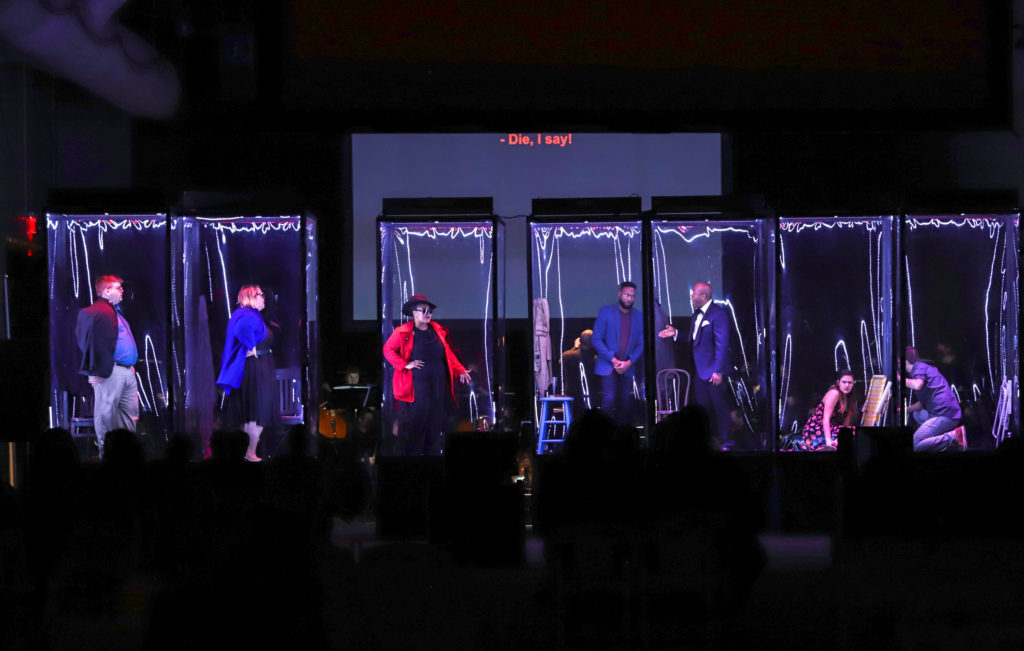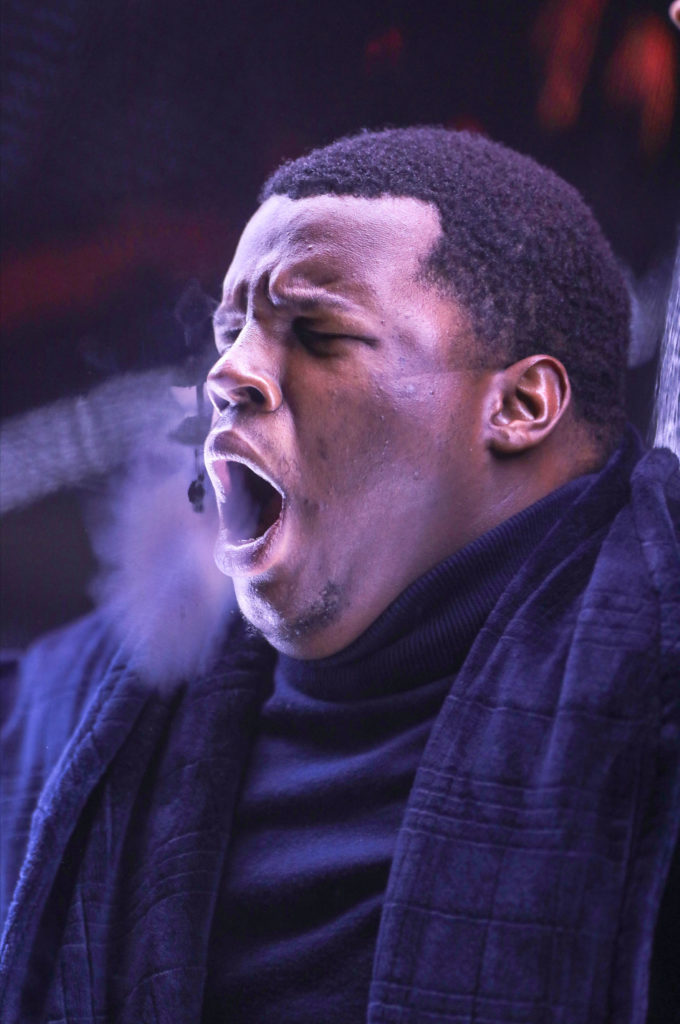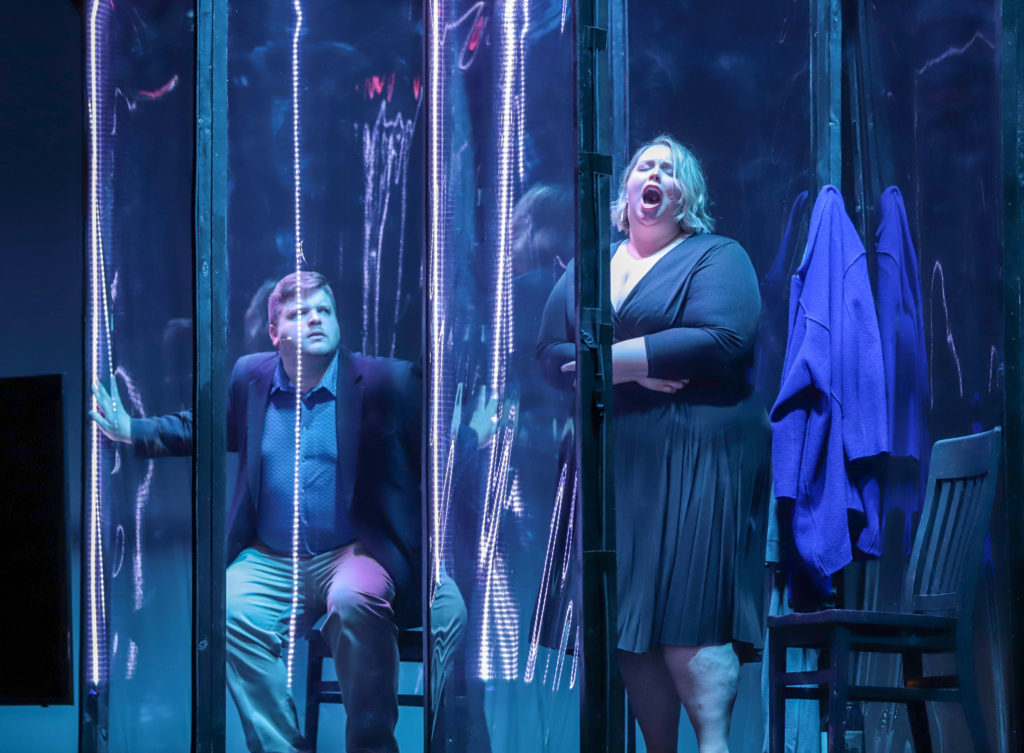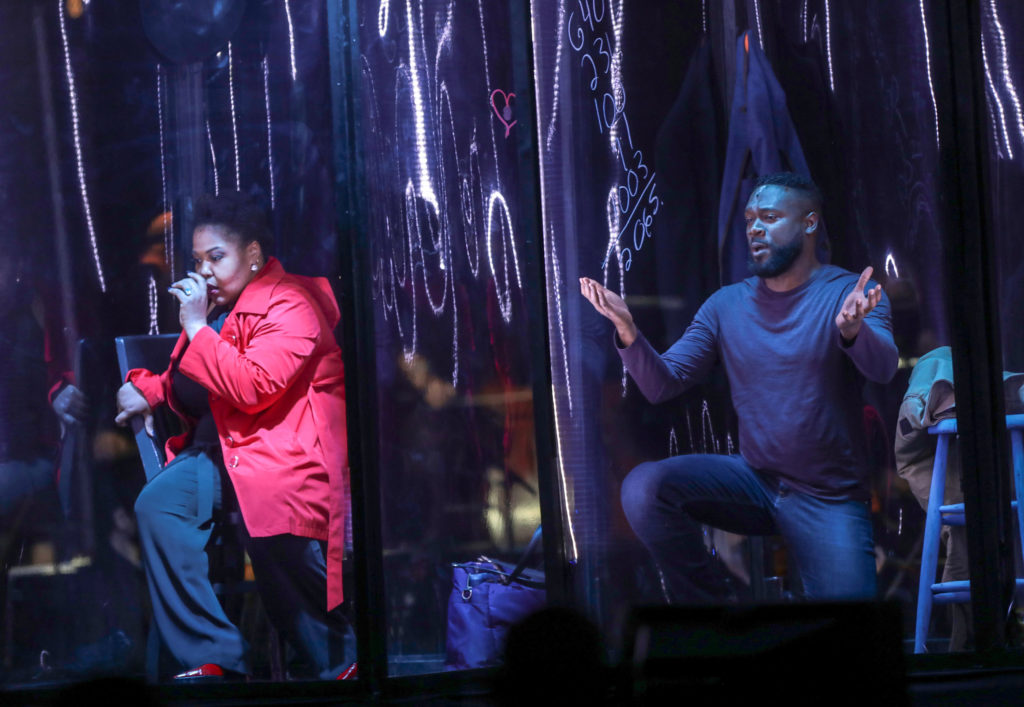Pentiti, cangia vita, e l’ultimo momento!
At the end of Mozart’s DON GIOVANNI, the man murdered by the title character at the top of the show returns to settle accounts.
“Repent, change your life!” he cries. “It is the last moment!”
“No, I will never repent, get away from me!” Giovanni responds. At which point Hell swallows him up.
—————————
HELL IS REAL, proclaims the billboard on Interstate 71, an hour north of Cincinnati.
I’m driving home after last night’s opening of Opera Columbus’ DON GIOVANNI. I was a late addition to the show, coming in just before the dress rehearsal to play the few recitatives left in the company’s ninety-minute pandemic version. Now I head south on a sunny Saturday, listening to Weekend Edition as journalist Rana Ayyub speaks to Scott Simon from Mumbai. Her voice is threadbare with grief, anger, and fatigue as she speaks of one family member and four friends dead in a two week span, of death tolls ten times the official counts, of hospitals out of oxygen, of cremations happening in the streets because the crematoriums are full.
Death and more death, and endless fire in a city running out of wood.
Another homemade sign just before my turnoff reads, “I WILL NEVER WEAR A FACE MUZZLE FREEDOM IS THE CURE.”
_______________
Last night, at the opera, the cast performed standing in individual vinyl towers, which new General Director Julia Noulin-Merat has likened to “a kind of hell.”

The tall, thin individual towers evoked so many images, hitting my mind hard and fast as I saw the lineup for the first time. Seven colleagues displayed like Amsterdam red-light district meat. Seven singers on deck for a misnumbered Cell Block Tango (he had it comin’). Seven humans standing in seven elevator shafts before seven plunges, seven friends waiting for Scotty to beam them up. I found it cold and stylish and a great way to keep maskless superspreaders safe in a COVID-era performance. And as the performance progressed, I also found it viscerally moving.
Director Eve Summer made the magic rules of the evening and followed them, and the audience followed them too because that’s why they came. That magic was certainly amplified by our long communal theatrical drought; everyone in the place was invested in having a great night, for sure. But what I felt happening as the show progressed was much more than goodwill and self-fulfilling positivity. When Anna turned to Ottavio to recount the trauma of her assault and her father’s murder, when Zerlina consoled Masetto, when Leporello wooed Elvira – the physical energy of each pair yearning through the impenetrable vinyl was painfully palpable in my own heart after endless months of division from family and friends. It was like watching Zoom screens brought to life, everyone visible, real, recognizable…and untouchable.
And from that emotional place, full of present sadness and frustration, the towers began to speak of something else: the inability, in the end, to really inhabit someone else’s world, as much as you may long to, hard as you may try. It was on my mind as I cycled through the radio stations of Central Ohio the next morning, from NPR to SRN. But there’s a specific flavor to the barriers of this opera, centering on the trustworthiness of women. Ottavio wonders if Anna is telling the truth about her assault, Masetto doubts Zerlina, Giovanni assures his noble friends that the accusing Elvira is crazy. The radio news of recent days sounded like #Metoo had never happened, recounting the open secrets of the abusive Hollywood producer Scott Rudin along with the heartbreaking accounts of writer Blake Bailey grooming and raping young female students (Giovanni to Zerlina: “Do you think a nobleman, as I consider myself, would allow you to marry such an oaf? Your teasing eyes and beautiful lips have earned you another destiny”). The image of the cast physically longing for each other through those barriers, yet using the barriers as a physical sign of their distance from one another, is testament to Eve Summers’ astute storytelling. It stays with me like a stone on my heart.
____________
The orchestra sat behind these towers, masked and distanced, with conductor Kelly Kuo’s masked countenance and gestures playing on two monitors out front. The singers, protected by their plastic, were not masked. They were miked, however, so in addition to using the monitors they could occasionally turn to see their conductor through the clear vinyl. The audience, restricted to about 150, sat distanced and masked in the large museum space, along with the folks running sound and lights.
I joined the process on Monday night, five nights ago, at the second to last rehearsal, which was our first in this space. Lighting and sound were worked out as we rehearsed. The eyes of musicians and tech crew alike were taut with concentration and worry. From my vantage point at the harpsichord, with little to do and nothing to worry about, I watched the musical labor happening around me. The orchestra musicians worked without a word, adjusting their visual and aural focus, learning how to parse what they were hearing in this new, odd room, changing their reactions on the fly. Kelly Kuo took razor-sharp judgment to the precious minutes of rehearsal time, forming each repetition into a stone that might ripple through the water of the dress rehearsal. The cast grappled with mics, light reflections on the vinyl, heat in the towers, judging and rejudging where to sing in relation to the image on the monitor as well as in relation to what they could hear. By the end of Monday night, everyone had nearly found each other. And after repeating just a few numbers at the dress rehearsal, the principal cellist said to me, “Now that was Don Giovanni.”
As often as I’ve seen it, it still is a mystical thing to me how a group of musicians figures out their space, how to hear and how to listen, how to read each other and react. When the downbeat came last night, the music poured out in comfortable sync and with generous beauty from orchestra and cast alike. The Pro Musica Chamber Orchestra played with character and warmth, as astutely as any group dedicated more specifically to opera, their color changing in response to the drama’s shifts. The cast, led by Jorell Williams’ gorgeously sung, charismatic Giovanni, was distinguished by rich vocalism and memorable characterizations. Meghan Kasanders and Victor Cardamone (Donna Anna and Don Ottavio) have full, warm voices that can both etch and soar, and their arias and duet were beautifully rendered. Amber Monroe’s (Donna Elvira) lucious sound combined noble restraint and musical daring. Aryssa Leigh Burns and Miguel Pedroza were fresh-voiced and honest as Zerlina and Masetto. Carl Dupont’s Leporello rivaled his Giovanni for elegance, and Chris Humbert’s impressive bass gave life to the Commendatore. Kelly Kuo led it all with warmth and verve, as though there were no special challenges to the layout or the space, trusting and leading his colleagues with joy.
Now that was Don Giovanni.
________________
Many elements of this performance will be found elsewhere around the country as we return to performing for audiences: the barriers, the masks, the mics, the small numbers. Other performances will be outside. Everything will be short, 90 minutes or less, no intermissions.
The audience I saw in Columbus enthusiastically cheered and welcomed the performance with these restrictions, but I can understand anyone who hesitates, longing for the energy of a packed theater, and especially for the range, nuance, and palette of acoustically produced sound in a resonant and beautiful space. But I say, if you’re near a performance like this, don’t miss it. Opera Columbus’ work is so much more than a valiant attempt to do something during the pandemic. It was art-making from within the world we inhabit now, speaking about and to that world.





